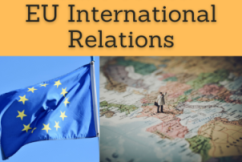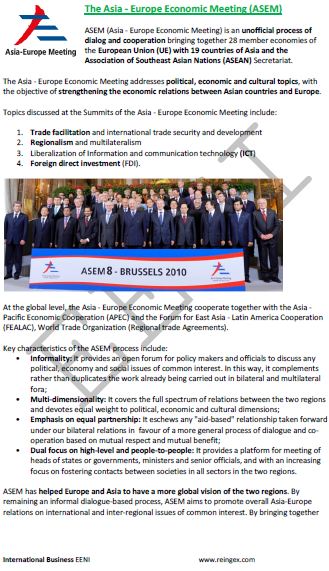Asia-Europe Meeting (ASEM) Trade Facilitation

Dialogue and Cooperation European Union-Asian Countries / ASEAN
- Introduction to the Asia-Europe Meeting (ASEM)
- International Trade Facilitation Programs
- Asia-Europe Foundation
The objectives of the subject “Asia-Europe Meeting (ASEM)” are the following:
- To understand the purposes of the Asia-Europe Meeting
- To know the ASEM working areas
- To analyze the ASEM trade facilitation programs

The Subject “Asia-Europe Meeting (ASEM).” belongs to the following Online Programs taught by EENI Global Business School:
Master: International Business.
Languages:  or
or  Asia-Europa
Asia-Europa  Europe-Asie
Europe-Asie  Asia Europa.
Asia Europa.

The Asia-Europe Meeting addresses political, economic, and cultural topics, with the objective of strengthening the economic relations between the Asian Countries and Europe.
Sample - Asia-Europe Meeting (ASEM)

ASEM (Asia-Europe Meeting) is an informal dialogue and cooperation process bringing together twenty-eight member economies of the European Union with nineteen Asian Countries and the ASEAN Secretariat.
The Asia-Europe Meeting (ASEM) members are Australia, Austria, ASEAN Secretariat, Belgium, Brunei, Bulgaria, Cambodia, Cyprus, Croatia, Czech Republic, Denmark, Estonia, European Commission, Finland, France, Germany, Greece, Hungary, Indonesia, India, Ireland, Italy, Japan, Korea, Kazakhstan, Laos, Latvia, Lithuania, Luxembourg, Malaysia, Malta, Mongolia, Myanmar, Netherlands, New Zealand, Pakistan, Philippines, Poland, Portugal, Romania, Singapore, Slovakia, Slovenia, Spain, Sweden, Thailand, UK, Vietnam.
The Asia-Europe Meeting Headquarters are in Singapore.
Topics discussed at the Summits of the Asia-Europe Meeting include:
- Trade Facilitation and international trade security and development
- Regionalism and multilateralism
- Information and communication technology (ICT) Liberalization
- FDI
At the global level, the Asia-Europe Meeting cooperates with the APEC, the Forum for East Asia-Latin America Cooperation (FEALAC) and the WTO (Regional Trade Agreements).
The only institution in the Asia-Europe Meeting is the Asia-Europe Foundation, a global not-for-profit foundation, responsible for promoting the cultural, intellectual and people-to-people contacts between the Asian Countries end Europe.
In the ASEM countries they are virtually all the largest religions of the World (Christianity, Islam, Buddhism, Hinduism...).
The Asia-Europe Meeting (ASEM) belongs to the economic areas of the Sinic-Buddhist Civilization, Hindu Civilization, Western Civilization and Islamic Civilization.
(c) EENI Global Business School (1995-2024)
We do not use cookies
Top of this page



